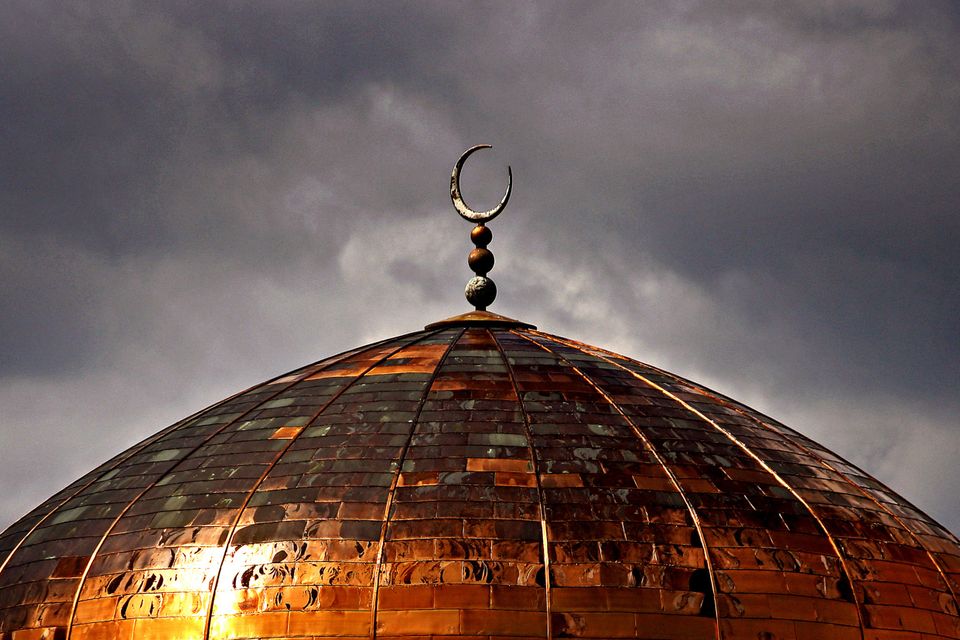West must offer idealistic young Muslims a real alternative to Isil's 'higher cause'
Last year, at least 100 young women from Britain were known to have volunteered and gone to the Middle East. There have been reports of much greater numbers – in their hundreds of thousands from many countries (Stock picture)
One of the most enduring and iconic female novels of the twentieth century is essentially about an impressionable schoolgirl who, infused by the ardour of her teacher, runs away to join Franco's forces in the Spanish Civil War of 1936-39. And, indeed, the poor girl dies for her foolish and immature idealism.
Muriel Spark's story 'The Prime of Miss Jean Brodie' describes a teacher who mesmerises her pupils with tales about beauty in art and the poetry of the Italian Fascist poet Gabriel D'Annunzio (Jean Brodie being unforgettably epitomised by Maggie Smith in the movie): all the teenage girls are under her spell, but in the film it's Mary MacGregor who takes all the fanciful fol-de-rol literally and sacrifices her life.
It is a persuasive picture, and captures both the power of a strong personality in the classroom, and the headstrong attractions young people can feel for a cause.
We may be appalled by the reported death of 17-year-old Kadiza Sultana, the East London schoolgirl who left home last year, and with two companions, bought a ticket to Turkey and made her way to Syria to join Isil.
It is now believed that Kadiza has been killed in a Russian bombing attack on Raqqa, and, naturally, her family in Bethnal Green are utterly devastated. Especially since Kadiza was a bright student with a promising future ahead of her - and even more especially because it seems she wanted to come back home; the Utopia that she dreamed of finding turned out to be domestic slavery and oppression. But she was trapped and couldn't escape.
Yet one of Kadiza's companions, Amira Abase - who was only 15 when she ran off to join Isil - has tweeted messages to indicate that she has found fulfilment with the aspiration of the 'Caliphate', the ideology of enshrining Islamic domination world-wide. The teenager texted that she missed her family but "u leave everything for the sake of Allah, and Allah replaces that with something else". Amira also, apparently, glorified in terrorist acts carried out by Isil in Tunisia and saw it as a war victory against the forces of the 'Infidel'.
Nobody knows how many young people from other countries - young men as well as young women - have volunteered to serve Isil. Last year, at least 100 young women from Britain were known to have volunteered and gone to the Middle East. There have been reports of much greater numbers - in their hundreds of thousands from many countries - who have joined Isil, some of whom have died, too.
Some commentators have compared the situation to the Spanish Civil War, which attracted young people from overseas to fight on both sides - some to support the Spanish Republic, as George Orwell recorded in 'Homage to Catalonia', but some, also, who believed they should defend Christian churches, clergy and nuns, who were being raped and slaughtered.
The parallel with the Spanish Civil War may not be valid, but in the minds of teenagers like Kadiza Sultana, it probably felt valid, when she first made the commitment. Is there something in the psychology of teenagers which beckons them towards self-sacrifice to a perceived ideal?
We can see such motivations occurring both in the lives of some of our own patriots, and in the stories of young people who are honoured in the annals of the saints. Many of the young men and women who supported the Rising of 1916 were hugely idealistic individuals who were prepared to sacrifice themselves for this ideal: Ruth Dudley Edwards's study of the individual characters of 1916 illuminates the very strong sense of putting a cause before personal ambition or gratification that prevailed.
Young volunteers like Con Colbert and Liam Mellows were prepared to give up everything for the cause they served - and indeed did give up everything, as it turned out. They were no longer teenagers when they died, but they were fired by the cause when they were still young.
Similarly with young saints like Aloysius Gonzaga, who was only 16 when he resolved to become a Jesuit missionary against his father's wishes: he did so anyway, and died in his twenties of the plague. Teenage girl saints who have dedicated their lives range from Joan of Arc to Bernadette of Lourdes, from Therese of Lisieux - who was a tubercular 15-year-old when she took the veil - to Maria Goretti, who was only 12 when she died resisting a rape, but already revered for her ardour in faith.
I am not, of course, drawing a moral equivalence between young patriots or Christian martyrs of the past, and contemporary young Muslims who rush off to serve Isil; all moderate Muslims agree that the so-called Islamic State is a cruel organisation which inflicts torment on victims, and exploits young people into suicide missions. But there is a parallel, surely, in terms of the psychological yearning among young people to serve a cause, and in the name of an ideal.
How can we halt radicalisation of vulnerable young Muslims - some of whom, like Kadiza, are clever young people, not particularly socially marginalised? Many are the solutions suggested to combat this radicalisation, from monitoring the internet to developing anti-radicalisation programmes.
Perhaps the tragic example of Kadiza Sultana can deter young women from such a fate.
But maybe some young people are searching for a loftier alternative to the values that are on offer for them in Western culture. Maybe they want a greater purpose than yet another new electronic gadget: maybe they seek an exemplar a little more high-minded than life among the Kardashians or some air-headed celebrity model they are expected to emulate? If we don't offer what Isil offers - a higher cause which some young people will want to serve - then we will lose the battle of values.
We know that "man cannot live by bread alone" and our obsession with economics perhaps overlooks the appeal that a visionary idea - however mistaken - can have for the young. It has to be factored into the equation.
@MaryKenny4
Join the Irish Independent WhatsApp channel
Stay up to date with all the latest news















